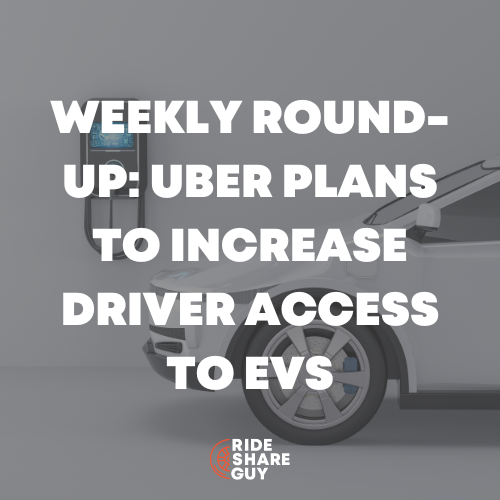Would you be surprised to learn how few passengers tip their drivers? If you’re a current driver, probably not! Senior RSG contributor John Ince covers that new study, plus new investments by Uber and Lime, in this week’s roundup.

Nearly two-thirds of Uber customers don’t tip their drivers, study says [Verge]
Sum and Substance: Only 1 percent of Uber customers always tip, while nearly 60 percent never do, according to a new study from the National Bureau of Economic Research (NBER). The average tip is 50 cents a ride, but for those who do tip, the average is more like $3. Men are more likely to tip than women, but female drivers get tipped more than male ones.
Tipping has long been a source of fierce debate, especially as it relates to ride-hailing companies like Uber. For years, the company rejected efforts to add a tipping option to its app, arguing it would overly complicate the seamlessness of the experience. But Uber eventually caved and now drivers earn hundreds of millions of dollars in tips every year. The NBER study on tipping with Uber is sure to throw more fuel on the fire. …
What they found was not a whole lot of tipping. Roughly 16 percent of Uber rides are tipped. Yet, most riders (60 percent) never tipped over the research team’s four weeks of data collection. Of those who do tip, very few (1 percent) tip on every trip. The remainder of people only tip on about 25 percent of trips…
There were other interesting findings, such as riders who have a five-star rating tip more than twice as often as those with a 4.75 rating, and when they do tip they do it nearly 14 percent more. The team also noticed important correlations between gender and tipping:
Male riders tip 23% more than female riders, a result largely driven by the fact that men are more likely to tip than women (approximately 19% more often). Further, female drivers are tipped more than male drivers—a fact that is true regardless of rider gender: men (women) tip female drivers nearly 12% (11%) more than they tip male drivers.
My Take: The data here is pretty much in keeping with other data we’ve got. Interesting to note that men tip more than women, but women drivers are more likely to get tipped.
Uber’s Disastrous Life Story Is Being Made Into a TV Show by the Creators of Billions [Gizmodo]
Sum and Substance: The team behind Billions is developing a show about the rough-and-tumble rise of Uber, based on the bestselling book Super Pumped.
New York Times reporter Mike Isaac interviewed hundreds of former and current Uber workers to tell the story about how Uber’s power-hungry CEO and founder Travis Kalanick grew the company a monster unicorn plagued by toxic culture and rampant labor rights abuses.
Kalanick was forced out by major shareholders in 2017 even after he reportedly squirmed in shame like a sad tiny worm. Showtime announced on Wednesday that Billions showrunners and co-creators Brian Koppelman and David Levien are writing and executive producing the limited series for the network. Isaac will also executive produce the show.
My Take: Sooner or later Super Pumped was going to make it to the screen. Let’s hope the film adaptation does it well. You can read our recap of the book over at our Super Pumped review here.
Dara Khosrowshahi says Uber remains committed to India but offers no concrete plans [Techcrunch]
Sum and Substance: Uber said on Tuesday that it has won a bid to work with the government-run subway system in India’s capital in one of its rare announcements in India, a key overseas market where it is facing a fierce battle with local giant Ola.
The ride-hailing giant said it has partnered with Delhi Metro Rail Corporation (DMRC) to deploy parking spots and introduce new products at 210 subway stations in Delhi, Gurgaon and Noida. Neither of the parties offered a clarification on how many years it would take for these deployments to materialize. A DMRC executive said Uber was not an exclusive partner for the subway system.
My Take: I don’t quite get this announcement. It gives us a little to go on, but not much more. I suppose it’s better than a press release – or maybe it is a press release disguised as news?
You Lost How Much on Scooters? [Gizmodo]
Sum and Substance: Lime, the company whose business model is buying thousands of electric scooters and just sort of leaving them there in the hopes people will ride them, is on track to lose $300 million this year.
Per a report in the Information, financial projections that are the “first detailed picture to emerge of Lime’s financial performance” show the company is set to lose the $300 million on revenue of over $420 million. Lime is losing so much money in large part due to “depreciation of its scooters and how much it costs to run warehouses that repair and position the vehicles,” with its fleet of 120,000 scooters seeing an average life of five months. That, of course, is exactly the kind of costs that would arise from leaving countless expensive scooters exposed to the elements and residents angry about said scooters.
Lime projects that next year gross revenue will increase to over $1 billion, and that efforts to improve the sturdiness of their scooters will cut operating losses in half, the Information wrote. But the 2019 figures have kept some potential investors wary of Lime’s losses from joining an effort to raise half a billion dollars in new equity capital, while the “investment climate for money-losing consumer businesses has cooled since Lime last raised funds in January” due to disastrous IPOs by Uber and Lyft and the ongoing WeWork mess. …
My Take: Can’t say I’m surprised by any of this. Lime projects revenue growth to over $1 billion, which is over 100%. Don’t see it.
Readers, what do you think of this week’s roundup?
-John @ RSG




